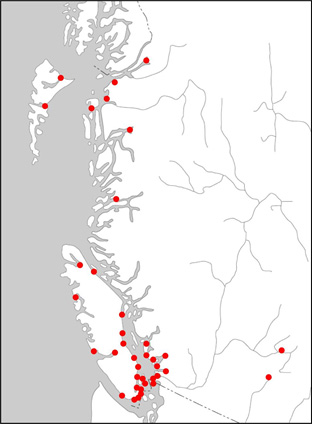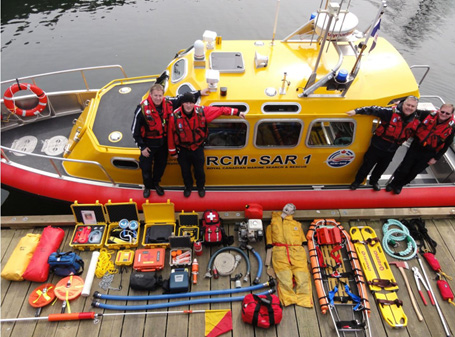Who Are We?
RCM-SAR – Saving Lives on the Water
Royal Canadian Marine Search and Rescue is the volunteer lifeboat service on the West Coast. We work alongside other agencies who respond to on-water emergencies such as the Canadian Coast Guard, police, and fire departments. RCM-SAR handles about a third of all marine emergencies on the West Coast. In many communities, the RCM-SAR rescue station is the primary marine emergency responder.
When an emergency occurs, we are tasked by the Joint Rescue Coordination Centre (JRCC) in Victoria, operated by the Canadian Forces and the Canadian Coast Guard. Once our vessels are underway, crews keep in touch with JRCC through Coast Guard radio dispatchers. Our crews resolve incidents independently or work in partnership with other agencies on the water.
RCM-SAR is an all-volunteer organization that operates more than 30 marine rescue stations on the British Columbia coast and in the B.C. Interior. From Vancouver’s busy harbour to the remote waters of the North Coast, our crews are on call 24 hours a day, 365 days a year, ready to respond to marine emergencies with 1000 volunteers and 45 rescue vessels. In an average year we respond to more than 800 marine emergencies. These include sinking vessels, injured mariners, lost or disoriented boaters, recreational paddlers caught in currents or bad weather, and shoreline searches for missing hikers and others.
Station 1 (West Vancouver) began operations in 1987 based in Fisherman’s and crew, and provides search and rescue operations covering the waters of Howe Sound, the Strait of Georgia, False Creek and English Bay up to the Lions Gate Bridge. We respond to most on-water incidents in the local area, as well as provide vital responder support to emergencies on the local islands. Station 1 responded to 87 marine emergencies in 2015, making it the busiest RCM-SAR station on the coast.
RCM-SAR 1 is typically operated by a crew of four but for specific emergencies can accommodate up to six crew and ten passengers. Crew members are all volunteers, and are trained and certified to Transport Canada and Coast Guard standards. All crew members are certified in Marine First Aid and at least one member on each shift has Advanced First Aid or First Responder qualification. Crews rotate in 12-hour shifts to ensure 24/7 coverage.
Rescue vessels are equipped to respond to a wide variety of emergencies on the water: life rings, throw lines and floating baskets for the recovery of persons in the water; first aid kits, spine boards and a defibrillator for resuscitation and other medical emergencies; plenty of blankets to warm up hypothermic patients; a davit to lift equipment and victims to/from shore; a dewatering pump to stabilize sinking vessels, and various devices for plugging leaks; fire hoses to fight vessel fires; diverse towing lines and hooks to assist grounded and broken down vessels; axes and bolt cutters to rapidly access confined spaces or cut away a sailboat’s rigging; etc.
Before assisting persons or vessels in distress, the hardest task is often to find the target: our rescue vessel has powerful fixed and handheld searchlights; an infra-red camera and night vision goggles; a radio-direction finding system; and electronic beacons to mark locations and compute drift. Radios allow us to communicate with other vessels, Coast Guard ground stations, and land-based search and rescue units.
RCM-SAR 1 is a jet boat built by Titan in Sidney, BC. We use jet propulsion for better maneuverability; easier beaching; and the absence of propellers in the water which reduces the risk of damage by logs, especially at night and at full speed. The vessel is self-righting, an important feature for a rescue boat which often operates in heavy weather and might be required to enter areas of large swells. Its jets are driven by twin diesel engines with a total of 870 hp, giving it a maximum speed of 40 knots (74 km/h) and an operating range of 11 hours at its normal cruising speed of 30 knots.


